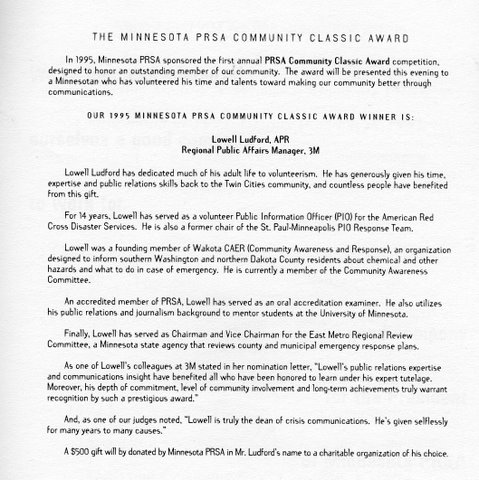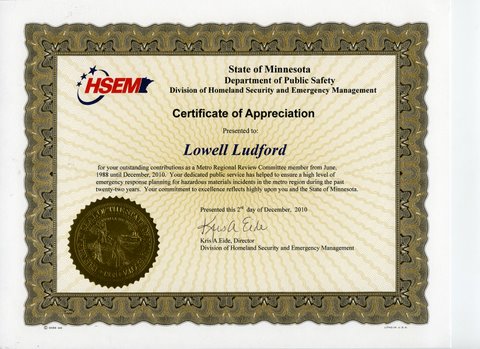He is retiring in January after 22 years as a member and the current chair of the Metro Regional Review Committee, a nine-member Minnesota Division of Homeland Security and Emergency Management agency that reviews city and county Emergency Operations Plans for compliance with federal and state regulations for hazardous materials incident response.
1. What are the highlights of your public relations career?

|
| Lowell Ludford, APR, Fellow PRSA |
2. What are some of the key lessons that you have learned in your career?
Perhaps the biggest lesson I learned in my career was the need to develop a trust relationship with those I worked with from other professions, many of whom were not familiar with and did not understand public relations or exactly how it might support them and their work. Engineers, for example, do technical writing where the conclusion comes at the end. Is an engineer going to trust a public relations person they don’t know who shows them writing that starts with the conclusion? The lawyers don’t trust you to write or say anything; except that they are good writers, many are even frustrated writers, and if you ask them to help with the writing that’s were a relationship begins. It takes time to earn the trust of those you are trying to support, but without it I found that success could be elusive.
Another lesson: hire APR. In my business travel around the country, I frequently needed local public relations help. Unfamiliar with the local public relations agencies and practitioners, it was a challenge to quickly find the ‘right’ one for my project the first time. Everyone said they could do the work, but not so. I soon found the best bet was to hire a PRSA member, preferably APR, which indicated basic qualifications.
3. Tell about your successes at 3M and some difficult challenges that you dealt with.

|
| Ludford received the Minnesota PRSA chapter’s first Community Classic Award in 1995 (now the Donald G. Padilla Distinguished Practitioner Award). |
I was responsible for public communication/information concerning the cleanup of several former hazardous waste disposal sites. The engineers and other technical personnel generally know how to do it and the lawyers have a set of legal procedures to follow. Together, they can get a waste site cleanup done in a straight-forward manner without much controversy or delay.
The great unknown is public reaction that can cause controversy, conflict, court battles, higher costs and long delays. Therefore, my job was considered important but it had difficult challenges. I found that by doing a very good job of keeping local residents and public officials thoroughly informed before, during and after, including public participation, it was possible to achieve public acceptance and cooperation. One of these success stories was a entry.
I developed a program to help 3M facility managers at factories, warehouses and sales centers around the nation become more comfortable doing public communication in their communities. These were mostly technical or business managers with no public speaking training and who, consequently, avoided public attention. The program, which included basic media training and more, created many success stories and improved understanding about the value of good public communication.
4. What predictions do you have for the evolution of public relations?

|
| The state of Minnesota recognized Ludford in December for his contributions to the Metro Regional Review Committee. |
Many states face severe budget cuts in 2011 and I fear this will put thousands of public information professionals out of work in state, county and city governments, and also school districts, forcing retrenchment and new approaches to public communication in the public sector.
Unethical behavior has become a serious problem in society. I hope I’m right in anticipating that public relations soon will become a recognized national leader in helping to deal with the problem. Public relations is in a good position to do so, it has the tools and it has a motive. I also think the will is present.
5.
WWhat advice would you give to new public relations practitioners?
WWhat advice would you give to new public relations practitioners?
I think most new public relations practitioners would do well to broaden their horizons, to see who and what else is out there, how others are functioning and to get new ideas and possibly new job prospects. A good way to start is by joining PRSA and becoming an office holder or committee chair, where interface with others will happen. Getting accredited will provide an advantage and a career boost. Join Kiwanis, Chamber of Commerce or other civic organization, volunteer or do something else to meet others and get known outside of the public relations community. If a particular type of public relations is favored, such as health care, agriculture, environment, etc., attend some conferences of groups in that field to learn more, especially by seeking out the group’s public relations director who is likely to be in the news media room (I did and it really helped). These extras obviously take time, effort and money, and not everyone is willing or able. But those new to public relations are likely to fall behind and become discouraged if they don’t take their own steps to move forward.
6. Is there anything else you would like to add?
Much (not all) of my work became what I call 'defensive public relations,' where public attention is not desired, but often can’t be avoided; in which case the communication better be right the first time. Otherwise, it can be a career-limiting experience. I think I was lucky, but I entered public relations after a dozen years in the news media (TV news) and that proved to be a great advantage. Then this: 10 years after I retired I was called to testify for eight hours in court, where I defended my public communications activities in an environmental lawsuit, and the dream job became a nightmare.
--

